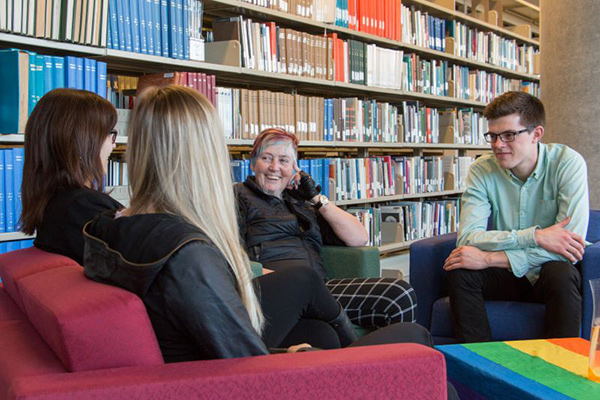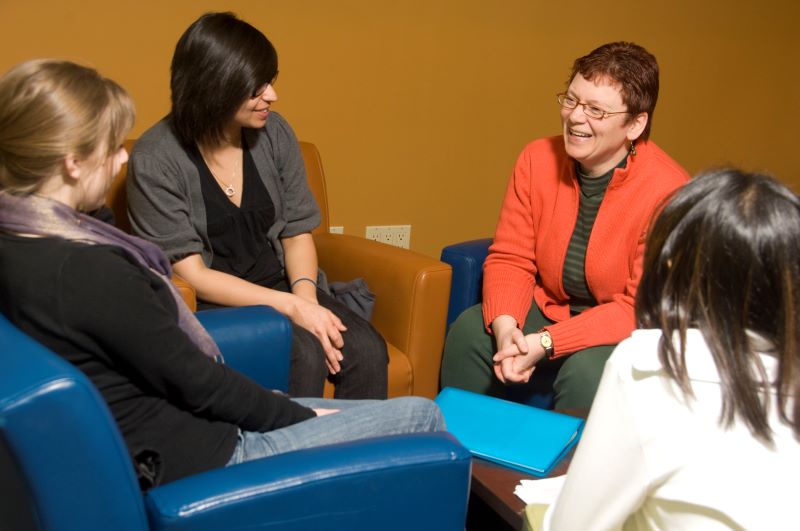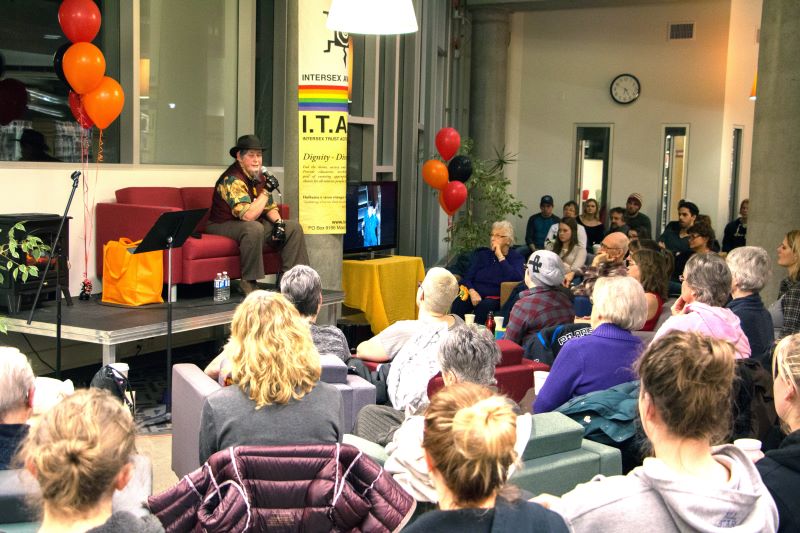Augustana library celebrates its 25th human library
Bojan Kumovic - 25 March 2021

Participants and a human book gather at the 15th augustana human library in February 2016. (Photo: supplied)
“Storytelling is a part of our history, and while books offer us an endless supply of knowledge and adventures, being able to take part in the unique setting of a human library, is an experience like no other. The courage that you witness while you listen first hand to the experiences of the ‘authors’ is not only humbling but life-changing. I am honored and forever grateful to have had the opportunity to listen to and hold the stories I’ve heard.”
Jenni Routhier, augustana human library reader
Twenty-one years ago, in the spring of 2000, the first human library event was organized in Copenhagen, Denmark. That very first event, called ‘Menneskebiblioteket’ in Danish, ran for four days, eight hours each day and attracted more than a thousand people. In its two decades of existence, the human library movement has spread on all continents, developed one of the leading diversity and inclusion training programs for corporations, institutions and organizations and most importantly provided a space for thousands of people to meet and exchange their life stories.
The secret of this huge success lies in the very essence of the human library: sharing unique life experiences of everyday people, called ‘human books,’ with other everyday people, called ‘readers’, through face-to-face sessions organized in safe and intimate environments. Human books, people who volunteer to share their stories of experienced prejudice, social exclusion or stigma, are ‘borrowed’ by ‘readers’ who are interested in their stories. The format is very simple and borrows terminology from the traditional library world. What makes it unique is the experience of ‘reading human books’ not only by listening, but also by subconsciously observing the subtle changes in emotion, sound of voice, body movements and facial expressions. Every human library session is filled with communication on many levels that deeply moves readers and human books alike.
“The human library, as a process, makes my heart sing—the authenticity and act of humans sitting in witness to each other. The connection, the respect, the simplicity and the power of the process. Stories go back to the roots of who we are as humans and in this fractured pain-filled world I think they have the power to relocate us, perhaps even heal.”
Mani Mitchell, augustana human library book
The University of Alberta’s Augustana Library organized the first augustana human library event in the 2008/09 academic year and was one of the first libraries organizing the event in Canada. “Over the years the lived experiences of close to 150 human books have been shared at the augustana human library and it has been our privilege to provide a venue for the sharing of these stories,” says Nancy Goebel, a librarian and the person who stands behind this event since its very beginnings. “The goal has always been to have the event further the development of empathy—something that is so important for a healthy society,” Nancy adds.

Taking place at the Augustana Campus, the University of Alberta’s liberal arts and sciences campus, the human library quickly gained a pool of dedicated readers and was soon integrated into parts of the curriculum. Looking back to the past years of the event and its strength to bring a unique and alive experience to learners, Nancy explains: “the augustana human library has been integrated into Augustana’s undergraduate curriculum in different ways over the years. One example was in an Introduction to Women’s Studies course where students would select a human book that spoke to issues of gender, sex or sexuality, and then the student would attend the human library and listen to the relevant human book’s story (eg. being transgender). They would then write a reflection on what it was like to learn, through human narrative, what it was like to be transgender. Then they would search an appropriate library database and find three scholarly articles on the same topic. They would also read those articles and write a critical annotation of the topic based on the research presented in the article. Lastly, the student would write a reflection about what it was like to learn about, in this case, being transgender comparing information shared as part of the human library book’s lived experience and the scholarly article information. It was a very popular assignment as students were able to extend themselves beyond their lived experience and consider the life of another person while also considering the findings of academia via scholarly articles.”
Organized each fall and winter semester over the subsequent years, the event significantly grew into an important cultural project not only for the Augustana community but for the University of Alberta and the City of Camrose community as well.

"The human library has been a very educational experience for us. We have appreciated hearing stories firsthand, the years of struggles and challenges some have experienced. It has helped us to better understand the difficulties and problems many people have had to face.’’
Dean and Elsa Hendricksen, augustana human library readers
This year, due to the pandemic and the necessity of social distancing, the 25th augustana human library will be celebrated through a virtual, online event. It will stay loyal to its principles and will offer four human books speaking about experiences of domestic violence, drug addiction, the tragic death of a same-sex partner and a decades-long journey with brain cancer. This free event will happen on Sunday, March 28, starting at 1:30 pm. You can find registration information, as well as more information on human books at the augustana human library webpage. We hope to see you there!
This blog post was originally published on the University of Alberta Library news blog on March 22, 2021.